The fiftieth anniversary of the Janáček Theatre opening is a great opportunity to perform a premiere of Janáček. Yesterday it was not The Cunning Little Vixen as on 2 October 1965, but Jenůfa was performed instead. Heavenly, symbolic and non-communicative.
Director Martin Glaser did not dress Jenůfa in holiday national costumes, the whole stage is festive. The enormous apple tree crown forms a natural canopy over the entire stage, which looks like a giant bed with a canopy promising fertility and abundance in the first act. There was an abundant harvest indeed and apples are everywhere; getting into everybody’s way whether they like it or not. There are apples in nearly every part of the play: grandma Buryjovka is slicing them at the beginning, Laca is squeezing them to get the juice, Števa is trampling on them angrily, and there are apples in a trug in Kostelnička’s house in the second act. Only the unsuccessful wedding, the dead newborn found and the whole unravelling of the plot in the first act were deprived of any help from above – the people must help themselves. The residential part of the house is only incidentally indicated in the first act by a walk-through object under the tree. A private household gains more importance in the crucial second act. Only there the characters are fully revealed in the stark world of the home of the reserved, bigoted, but also shaky Kostelnička.
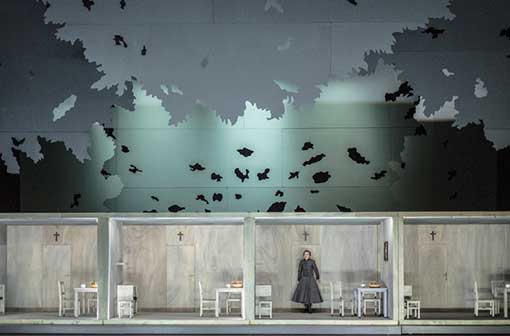 In the second act the outer scenery fades out, the apple tree crown becomes a mere silhouette and the focus is shifted to the kitchen – there are actually four identical kitchens built on the stage next to one another. The same table, the same position of the chair, the same holy card on the wall, the same changeable light, the same door opening to the next room where only a crib can be seen. Kostelnička is talking to Jenůfa, and then Števa is coming followed by Laca. However, they rarely meet in one of the four rooms. They are usually each in their own room together with their ideas and interests, their lines and repartees are sent somewhere to the empty space. They do not know who they are talking to or if the other person understands. The idea as such is impressive, but – and now we are getting to the heart of the matter – it is suitable for a totally different opera.
In the second act the outer scenery fades out, the apple tree crown becomes a mere silhouette and the focus is shifted to the kitchen – there are actually four identical kitchens built on the stage next to one another. The same table, the same position of the chair, the same holy card on the wall, the same changeable light, the same door opening to the next room where only a crib can be seen. Kostelnička is talking to Jenůfa, and then Števa is coming followed by Laca. However, they rarely meet in one of the four rooms. They are usually each in their own room together with their ideas and interests, their lines and repartees are sent somewhere to the empty space. They do not know who they are talking to or if the other person understands. The idea as such is impressive, but – and now we are getting to the heart of the matter – it is suitable for a totally different opera.
Martin Glaser built his production of Jenůfa on the theory that the acting characters live surrounded by Divine (or probably natural) order, which is good, beautiful in an intoxicating way and which provides the people with everything they need. The dead child’s tragedy, ruined relationships, wrecked people and reputations is caused by the people of this ideal world themselves because they do not talk to each other, or rather they do not communicate. They do not want to understand, they do not sense the others, they do not emphasize. Only the last thing is probably true, as the characters in Jenůfa talk to each other very openly, sometimes even rather rudely. They do not respect each other, they are able to say horrible things even to each other’s faces and they, very likely, have a clear idea about one another. Kostelnička tells Jenůfa with no scruples that it is better that her child died. Števa cries sentimentally, however, he offers nothing but money to Kostelnička for Jenůfa – no wedding, because he has another, better girl. Laca’s visits to Kostelnička are rather monotonous but he has good intentions at least and he understands he hurt Jenůfa. Everybody knows that about themselves and they cannot hide anything from one another until Kostelnička drowns Jenůfa’s child – naturally, she does not brag about it. Why are there the separate rooms then?
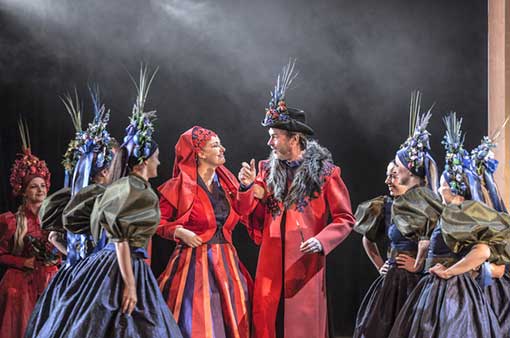 The audience must find their own answers; there is no hint in the play production. The multiple meaning of apples, the tree or the tree crown full of apples leads to many conclusions but these lead the audience to nowhere. These universals symbols can be taken to construe anything and to find many arguments for Glaser’s solution as well as against it. The costumes by Markéta Oslzlá-Sládečková are informal in the first two acts, they evoke Moravian national costumes freely in the third, wedding act where they start to be exaggerated – especially the magistrate’s family wearing red and rainbow-coloured clothes. The stage of Pavel Borák is a strong aspect of the entire production; it makes us see the performance as one large whole and not to see details only. However, one cannot help noticing that the characters do not play really; they tend to hide emotions rather than showing them. Števa, when drunk, holds Jenůfa in his arms in such a way as if he had no idea what to do with a woman and the production seems to be static, there is little movement. Why Jano, who is learning to read, is a girl all of a sudden, it is hard to say.
The audience must find their own answers; there is no hint in the play production. The multiple meaning of apples, the tree or the tree crown full of apples leads to many conclusions but these lead the audience to nowhere. These universals symbols can be taken to construe anything and to find many arguments for Glaser’s solution as well as against it. The costumes by Markéta Oslzlá-Sládečková are informal in the first two acts, they evoke Moravian national costumes freely in the third, wedding act where they start to be exaggerated – especially the magistrate’s family wearing red and rainbow-coloured clothes. The stage of Pavel Borák is a strong aspect of the entire production; it makes us see the performance as one large whole and not to see details only. However, one cannot help noticing that the characters do not play really; they tend to hide emotions rather than showing them. Števa, when drunk, holds Jenůfa in his arms in such a way as if he had no idea what to do with a woman and the production seems to be static, there is little movement. Why Jano, who is learning to read, is a girl all of a sudden, it is hard to say.
The production of Martin Glaser is nice to watch but it is hard to understand at the same time. The misunderstanding can be on the side of any spectator or a reviewer; however, there is one void place the production was unable to avoid – the scene with enlistees in the first act. The young boys from the village return from the military draft, both the enlisted and the ones who were not enlisted, and all of them have good reason to drink like a fish, which is, by the way, one of our national customs even nowadays. They return to the village, singing in high spirits and they tap their feet in a well-mannered way, the girls throw apples and at the back of the stage a ballet group forms a live background with refined grace. I do understand the unwillingness to stage the scene as a rioting mob of totally smashed idiots, who break bottles, brawl, strip and have sex on the stage; nevertheless, this scene was a bit too extreme too. Not even young Catholics return like this from confirmation. And a similarly stiff impression was made by the choir of bridesmaids in the third act.
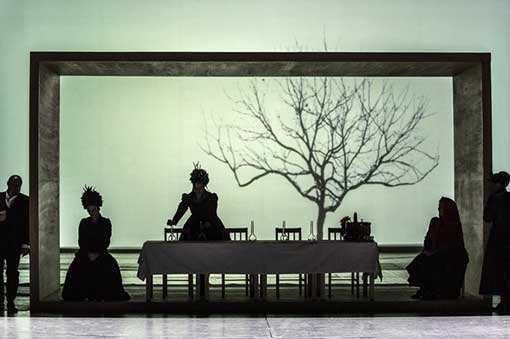 All in all, it brings the change of the atmosphere for the better. The apple tree withered and stood bare at the background, the people were together, communicated more to one another and the staging started to work and impress again. Finally there was something that you would rightly expect from Jenůfa: strong emotions. In the end Jenůfa and Laca stayed all alone on an empty stage, they stayed together. However, they were not leaving towards the rising sun but the rain. It may be a way too blatant symbol of what they can expect in their future life, but is in harmony with the fact that the third act started to use clear language.
All in all, it brings the change of the atmosphere for the better. The apple tree withered and stood bare at the background, the people were together, communicated more to one another and the staging started to work and impress again. Finally there was something that you would rightly expect from Jenůfa: strong emotions. In the end Jenůfa and Laca stayed all alone on an empty stage, they stayed together. However, they were not leaving towards the rising sun but the rain. It may be a way too blatant symbol of what they can expect in their future life, but is in harmony with the fact that the third act started to use clear language.
The music production of Marko Ivanović is based on a brisk pace culminating with plentiful accelerandos. It is actually in direct contrast with the minimalistic direction which reduces the character’s movement at the maximum. Marko Ivanović, on the contrary, forces the music to move whenever opportune and, in my opinion, he is giving the singers and the choir hard times sometimes. He is very particular about regular rhythm, he does not allow the singers to continue long vowels, and he is more interested in the notes than compromises to the common cadence of “spoken” language. The interpretation of Ivanović corresponds to the direction in ignoring emotions. The staging acquires a different spirit than usual, but it has its charm. The orchestra sound does not deny the characteristic Janáček’s “holes” in the instrumentation, it does not cover them with exaggerated vibrato, and its play is very brisk and precise. The “1908” version was performed there, which was critically prepared by Charles Mackerras and John Tyrrell. However, when it was chosen, the aria of Kostelnička in the first act could have also remained.
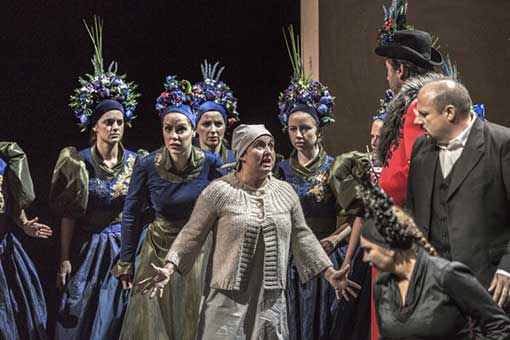 Singers made the impression that during the show they warm up at the same time as they are being directed. The first act lacked the cantilena, only during the course of time they began to connect their singing into melodic arcs, which belong to Jan's voice corresponds to the part of Kostelnička as well as it has the dramatic energy; however, she managed to find many human aspects in her. The outer austerity and the inner suffering of the character were balanced in her interpretation. Pavla Vykopalová is predominantly a lyrical type and her Jenůfa was like that – gentle and delicate. I think she should avoid half-spoken manners – even though she is economical with them, they do not sound natural. Jaroslav Březina is an excellent Laca; he is boorish and also tender in a clumsy way. Tomáš Juhás was a believable, even though a bit rigid Števa from the point of view of acting. In minor roles I should mention especially Jitka Zerhauová in the role of Grandma Buryjovka and Martina Králíková as Jano. The choir also performed on its excellent level as usual.
Singers made the impression that during the show they warm up at the same time as they are being directed. The first act lacked the cantilena, only during the course of time they began to connect their singing into melodic arcs, which belong to Jan's voice corresponds to the part of Kostelnička as well as it has the dramatic energy; however, she managed to find many human aspects in her. The outer austerity and the inner suffering of the character were balanced in her interpretation. Pavla Vykopalová is predominantly a lyrical type and her Jenůfa was like that – gentle and delicate. I think she should avoid half-spoken manners – even though she is economical with them, they do not sound natural. Jaroslav Březina is an excellent Laca; he is boorish and also tender in a clumsy way. Tomáš Juhás was a believable, even though a bit rigid Števa from the point of view of acting. In minor roles I should mention especially Jitka Zerhauová in the role of Grandma Buryjovka and Martina Králíková as Jano. The choir also performed on its excellent level as usual.
The entire staging of Jenůfa is interwoven with the absence of emotions. As though the authors forgot that they were working with the verism which was pushing the emotions forward – very often beyond emotional abuse. The performance, however, is spectacular, the technical and minimalistic solutions will find the supporters and the vocal parts will stand the test with no difficulties.
Leoš Janáček: Jenůfa, libretto the composer based on the play by Gabriela Preissová. Music production: Marko Ivanović, director: Martin Glaser, stage: Pavel Borák, costumes: Markéta Oslzlá-Sládečková, lights: Martin Špetlík, choreography: Mário Radačovský, dramaturgy: Olga Šubrtová, choir leader: Josef Pančík. Grandma Buryjovka – Jitka Zerhauová, Laca Klemeň – Jaroslav Březina, Števa Buryja – Tomáš Juhás, Kostelnička – Szilvia Rálik, Jenůfa – Pavla Vykopalová, Chief Miller – Ivan Kusnjer, Magistrat – Ladislav Mlejnek, Magistrate’– Jana Hrochová, Karolka – Eva Štěrbová, Pastuchyňa – Jitka Klečanská, Barena – Lenka Čermáková, Jano - Martina Králíková, Aunt – Ivona Špičková. The orchestra and the choir of the Janáček opera. 2 October 2015, The Janáček Theatre, Brno, premiere.





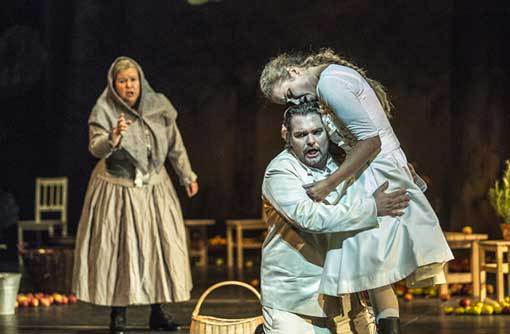



























No comment added yet..